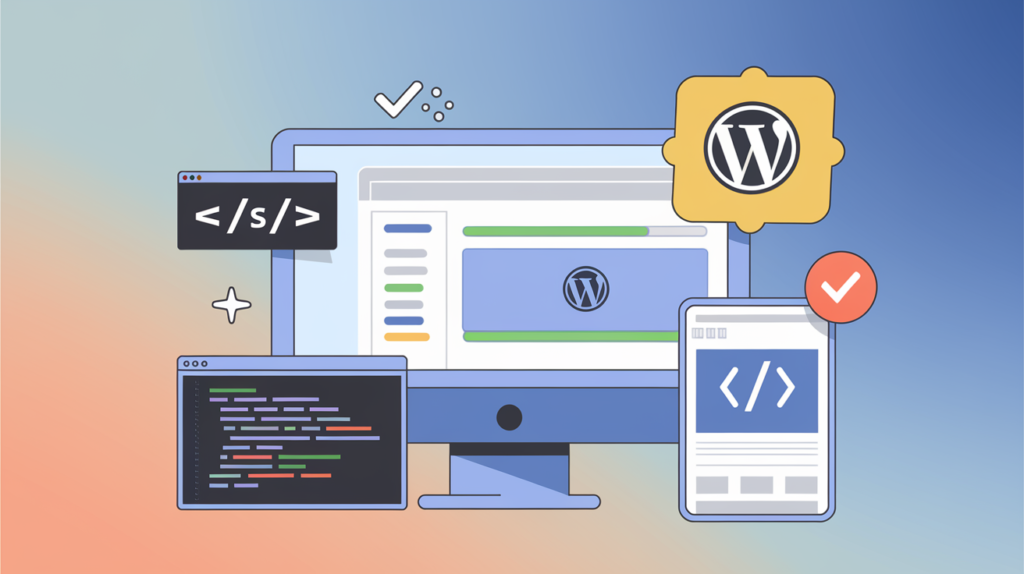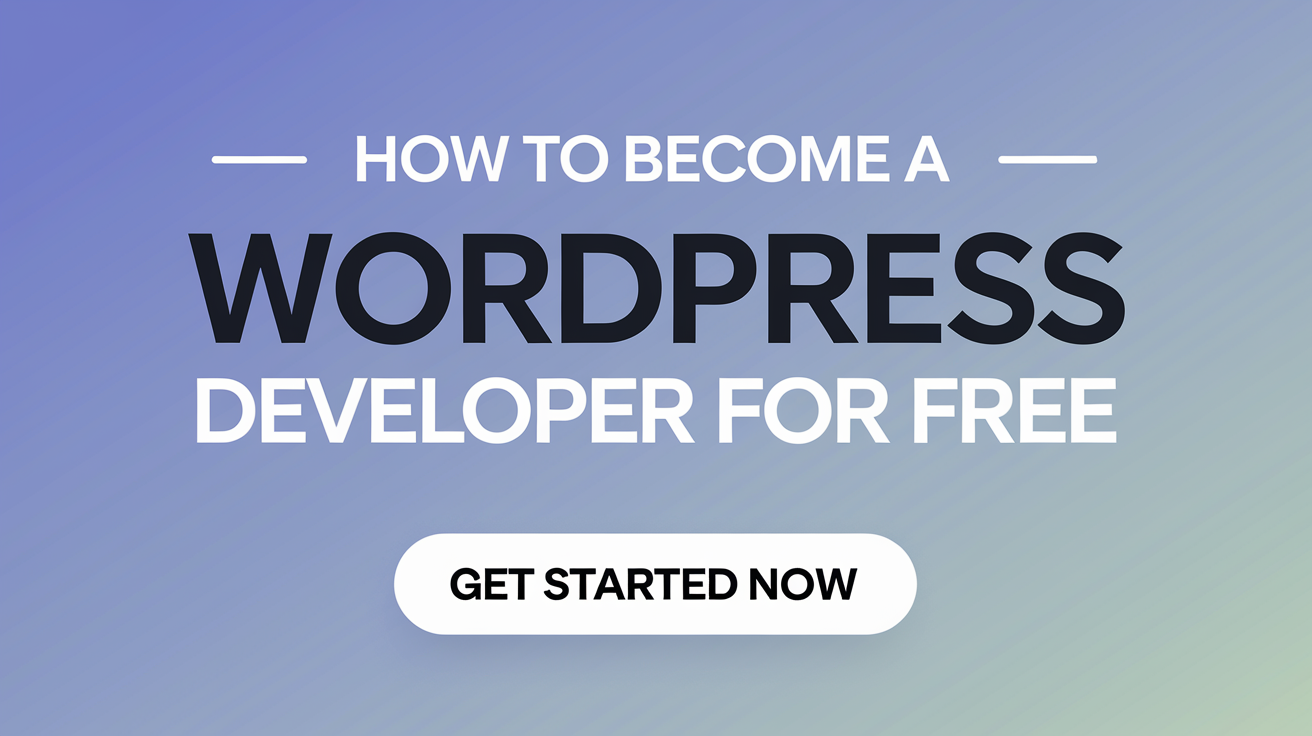WordPress Developer acts as a content management system though is one of the most widely used with over 40% of websites being developed under this platform. Whether you want to create new themes and plugins or you’re new to web development, WordPress provides a platform to work on. Even better, you can become a WordPress developer and start developing WordPress websites for clients completely for free.
Following is the summary of this blog post, which outlines the necessary information one should go through to become a wordpress developer for free. Let’s get started!
Get Familiar with Web Development
WordPress development for beginners step 1 — Getting acquainted with the basics of Web Any web development process must start with familiarizing yourself with the principles of the future product, and WordPress is no exception. WordPress is built on a stack of many popular web technologies, and knowing them is crucial if you’re going to develop for WordPress. Here are the key areas you should focus on:
- HTML (Hypertext Markup Language): This is the simple tag language that is used in the manufacture of web pages. It shapes the content of your work depending on the type of document you intend to produce.
- CSS (Cascading Style Sheets): CSS is the toolkit that allows you to apply styles to your Web page and build up the general structure of the page. It determines how your content will look like.
- JavaScript: With this programming language, you can include interfaces in your site for this purpose. JavaScript is also used actively in WordPress mainly when dealing with custom themes or plugins.
- PHP (Hypertext Preprocessor): PHP is a server-side scripting language on which WordPress was developed. WordPress mainly uses PHP as language for designing themes and plugins, so it’s important to know PHP language.
Free Resources to Learn Web Development:

- Mozilla Developer Network (MDN): A great resource for learning HTML, CSS, and JavaScript.
- FreeCodeCamp: Offers a free, interactive curriculum on web development.
- W3Schools: A beginner-friendly website offering tutorials and references on HTML, CSS, JavaScript, and PHP.
Learn About WordPress Core Concepts
After mastering commonalities with web development, it’s high time to get acquainted with WordPress peculiarities. Before jumping into development, there is certain structure and functionality native to WordPress that has to be attained.
Also read: Future of Web Design WordPress Website AI Builder
Key concepts to learn include:
- Themes: A WordPress site is designed by themes that revolves with the display of the site. They control its appearance, but they also provide a possibility for altering some aspects of the features by utilizing WordPress theme templates and functions.
- Plugins: Plugins are software components that add more qualities to WordPress functionality. There are a lot of plugins which are already available for adding new features to any website, like adding new forms, such as, the contact form, or adding the search engine optimization tools etc.
- WordPress Loop: The Loop is by which WordPress captures content from a blog and shows the selected posts on a page.. It’s a central idea for any WordPress developer.
- Hooks (Actions and Filters): Hooks enable you to alter WordPress functionality, something that you would not do through core files. Filters allow only to alter existing operations and actions allow you to extend the functionality of those operations.
Free Resources to Learn WordPress Core:
- WordPress.org: The official WordPress website has extensive documentation on themes, plugins, and the WordPress API.
- WPBeginner: A beginner-friendly site that covers everything WordPress-related.
- YouTube Tutorials: Channels like WPBeginner, WPCrafter, and others provide free tutorials.
Create a Local Development Environment
Before starting with WordPress development you will need local environment setup Let’s create WordPress Development Environment step by step. This makes it possible for you to design, develop and experiment WordPress themes and plugins on your computer without endangering a live website.
You can easily set up a local WordPress environment for free using one of the following tools:
- Local by Flywheel: One of the easiest to use and best of all, its free for anyone who wants to setup a local WordPress environment within a few clicks.
- XAMPP: Another much freer program that allows you to configure PHP, MySQL, Apache for local installations of WordPress.
- MAMP: A tool which is comparative to XAMPP, but has more specialized function for macOS.
- Once you have this setup with your local environment, you begin creating your WordPress theme or plugin.
Use WordPress Theme Development
It is the themes that make WordPress websites great. It is actually relevant to learn how to construct the custom themes as one of the essential skills in WordPress development. The key files and concepts to understand in theme development include:
- style.css: The style sheet of the theme is the principal one. It is needed for your theme as it contains the CSS for it.
- index.php: The file that is used for a theme whenever the theme does not have its own particular template file. Its mandatory with every WordPress theme regardless of the complicated development process.
- Template Hierarchy: WordPress follows a particular order to decide which template file has to be used to render the content. For instance, WordPress can use single.php to showcase a single blog entry or use archive.php to showcase a list of entries.
- functions.php: A file that permit you to include or insert your own PHP code to the existing stylesheet of the theme. It enables you to include additional features on your WordPress website.
Free Resources to Learn Theme Development:
- Underscores: A starter theme for WordPress that you can use as a foundation for your own themes.
- Theme Development Handbook: Official WordPress documentation on theme development.
- WPShout: Offers theme development tutorials and articles.
Learn WordPress Plugin Development
Just like themes determine the looks of the WordPress site, plugins determine the behavior of the same site. Custom plugin development can also be a money-making profession in case you’re preparing to represent or work for clients.
Important concepts to learn include:
- Custom Post Types: Add any number of content types other than the standard WordPress posts and pages such as portfolio or testimonial.
- Custom Taxonomies: Share content within groups in different manners using one’s own taxonomies.
- Shortcodes: Enabling users to include extra content or feature, into the posts and pages with just a simple shortcode.
- WordPress REST API: The WELL is used for letting a developer interface with WordPress from an outside application. It can be useful to understand that it is possible to build really complex features on top of it.
- Free Resources to Learn Plugin Development:
- Plugin Handbook: Instructions on the official website about making wordpress plugins.
- TutsPlus: Provides many extensive and detailed tutorials for developing in WordPress and plugin development included.
- Pippins Plugins: A blog of a top wordpress developer, who also has tutorials for plugin development.
Join the WordPress Community
WordPress has a great community that offers a lot of support and inspirational advice. Any given forums you sign up for, meetups you attend, and open source projects you contribute to are all great resources for growing your industry connection and can even assist you when you are having trouble with your work.
Here are some ways to get involved:
- WordPress Meetups: These are social gatherings which are not funded, and which take place at various locations across the globe. The WP Meetup site can help you find them.
- WordPress Forums: One of the most important resources for users is that the official WordPress forums are perfect for questions and solutions.
- Contribute to WordPress: You can help WordPress in translations or writing documentation or even coding for it. If you need more information, you could visit the Make WordPress page first.
Build Your Portfolio
To be on the right side of the law and in a bid to discourage potential employers from taking the raw with the remix, build a portfolio when you are learning and growing as a WordPress developer. Develop one or two websites, themes, or plugins and showcase them on a site of one’s own. Your portfolio is useful when you start off as a freelancer or if you are searching for a full time job as a WordPress Developer.
You can use WordPress alone to build your portfolio site — it’s now common practice to build your own website with WordPress to showcase your WordPress proficiency.
Keeping up with the trends regarding WordPress
WordPress is dynamic platform that makes updates, plugins, and themes are available frequently. It is crucial to remain up to date with the WordPress trends and the correct way of using the platform over short and long periods. Some ways to stay updated include:
- Follow WordPress Blogs: The WP Tavern and Torque Magazine present WordPress news and novelties.
- Subscribe to Newsletters: Currently, there are many WordPress developers such as WP Mayor and Post Status, who send out weekly newsletters with WordPress advice and updates.
- Attend WordCamps: WordCamps are unsalaried conferences that are annually held by the WordPress community. They have speakers and coder panels which provide a great way to meet people.
It is crucial to understand that there is a lot of free resources available out there to become a WordPress developer for free. As you learn the fundamental of website development, understanding the core concepts of WordPress, creating a local environment as well as practicing, you will be able to become a WordPress developer. Just the time, devotion, and that basic desire to make it in life that most people look for.


3 thoughts on “How to Become a WordPress Developer for Free”